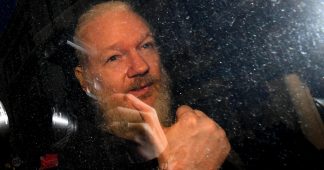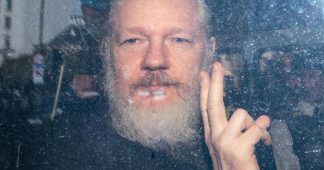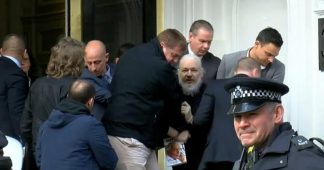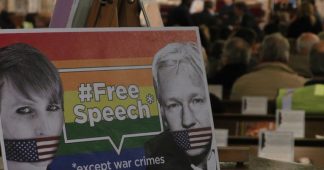By Monika Karbowska
As the social struggle in France intensifies the UK takes a look at itself in the context of the Brexit melodrama. It seems that a cycle is coming to an end. That of “happy globalisation” and “free internet” of which Julian Assange was the hero before being cast by the same system into the gloom of poorly identified prisons. Greta Thunberg has been handed the baton of Noble Prize media tool, the globalised prize awarded to those whom the West wants to promote as “stars of the free world”, started by Lech Walesa in 1982. This end-of-cycle feeling accompanies me on my trip to London for the hearing on December 13th, during which Julian Assange will face the ultimatum of delivery to the United States.
Paris public transport is on strike and so I made the journey on foot to take my low-cost coach to London. The sea was rough and the Channel crossing took longer than expected and so I arrived at the court at 7:40am to join my colleague from Wikijustice. For the first time since September we wont have any problems accessing the courtroom. This is certainly the fruit of all our actions, the report sent to the UN, the letters to the court, the administration and British MPs and the protests by our friends in various countries. Indeed, “Greekemmy” has disappeared and the women in her group who arrive later are not hostile. Still, we feel a certain anxiety as we enter the courtroom, go up to the first floor and notice that Julian Assange’s name does not appear on the list of extradited persons in room 3. It’s only a minor setback, as in November, and an employee soon updates the lists on the doors with the new one including approximately twenty names with “Julian Assange extradition USA” at the top. It seems that this court specialises in the extradition of Eastern Europeans, because the list once again includes Poles, Romanians, Albanians, Slovaks, Lithuanians, a Finn and Julian Assange. London is a metropolis holding a significant population of migrants, and I’m thinking that there must also be extradited people from South America, the Caribbean, Africa, Asia… but where are they to be judged?
Lawyers and translators gradually arrive while we hold on firmly to our place in front of the entrance from 9am to 9:45am.”Greekemmy’s” group begins to grow but John Shipton and Kristinn Hrafnson, are conspicuous by their absence, while Nils Melzer never comes to the hearings. The women who was assisting John Shipton last month, is in charge of reporting for the “Wikileaks officials”. The “UnityforJ” group is joined by a young man, Thomas Scripps, candidate for the Trotskyist Socialist Equality Party in a central London constituency. Gareth Pierce arrives around 9:30am. With all due politesse we attempt to ask her for information about the hearing on December 20th – the hearing that the Spanish judge managed to prize from the British authorities by a “European Investigation Order” as part of the investigation into spying on Julian in the Ecuadorian apartment in Hans Crescent by the Spanish company UC Global from 2012 to 2019[i]. For once he may be allowed to speak freely, as a witness in front of the dock and not be silenced and locked in the glass box as the accused. It is a crucial audience for his supporters because we hope to hear his spoken word and pass it on to the world. Unfortunately, Julian Assange’s lawyer clearly does not consider that support is important in this struggle for the freedom of a political prisoner. She refuses to tell us in which court the hearing will take place. We will have to figure this out for ourselves.
We are now used to the routines of the courtroom. At 9:30am the clerk usually opens the room to organise the work but this time the doors remain closed for a long time while an unusual commotion reigns in the room with comings and goings through the back door reserved for judges. At 9:45am the security manager finally opens the door and allows the people from the press with a valid badge to enter. There will be 6 journalists in total. Then, to our great relief, he announces, that there will be no list of names and that the first-come, first-served rule will apply. We are the first to enter, followed by “Greekemmy’s” group that numbers nine and which surrounds us on the seats in the public gallery. Not quite a crowd this time to see Julian Assange reinforcing the awful impression that the game is already over. Surprise! The video screen to the right is already on. It shows two navy blue seats in a space with black or dark blue walls. Behind the seats there is a small window and a panel with the words “HMP Belmarsh” in large letters, with another smaller inscription that I can’t read. Until now, no visible signs of the prison have appeared, and the presentation box is not the same as the one from which the other prisoners spoke. Clearly, the British court was influenced by our doubts about the location of Julian Assange’s appearance. The usual ballet of lawyers and interpreters of those extradited from Eastern Europe begins. They greet each other and register with the clerk, the same man as on November 18th. For the Julian Assange hearing, it is the accuser Clair Dobbin who presents herself first and takes a seat before the judge. There will be no British prosecutor this time. I allow my gaze to survey the room from the screen marked “Belmarsh” to the tribunes trying to spot potential American accusers who, according to media rumours, are present. I notice two young men in light suits who are sitting behind the lawyers who don’t seem to be regulars. I also recognise the young, well built man with the 80’s style blond hair who was present on November 18th and who we know not to be a lawyer. Once again he leaves as soon as the hearing is over. At the café later, we will try to procure his role but his answer will be “I have nothing to do with this Julian Assange”. Really! Then what was he doing in the room at these two specific hearings?
The situation is bizarre because at 9:55am everyone leaves and it becomes quiet. The lawyers for the Eastern Europeans work at their computers and the video screen continues to show “Belmarsh”. The clerk comes through the back door then leaves again as does the secretary. There are people coming and going, to and fro, through the judges’ door, but we have no idea who they are. Gareth Pierce is missing too although we didn’t even see her leave. Time passes. At 10:00, the clerk returns and activates the video. Then we see the same red seats as the November 18th hearing with the small window at the back of the box. What is new is the panel above the seats which reads ”HMP Belmarsh, visitor court room”. He calls a guard to ask him if he can bring the accused in. We then see the torso of a tall, well built man dressed in a leather strapped uniform with no visible badges. His head is out of camera shot, while the guards of the other detainees are always briefly filmed from the front. He says something and then lowers his head and I see in a split second a young face with long, tussled blond hair. He disappears and then reappears in the box window. In this same window we can also see the silhouette of another person. It is Julian Assange, who enters the small room and sits on the middle of three chairs even though the hearing has not started and Gareth Pierce, the judge and the clerk are still not present. Clair Dobbin, the public and the other lawyers wait.
What is going on? Is there method in this madness? Are we to bare witness once again to the torture of Julian Assange, as on November 18th, like visitors at the zoo before a caged animal, to send us back home once and for all to our hopelessness faced with this proclaimed and almost already carried out extradition? This time the sickening perversity of the British administration is carefully measured because it lasts longer; 20 minutes to be precise. Unlike on November 18th, Gareth Pierce is not here to see her client. I know that the hearing cannot begin without the defence, but since it is not the lawyer who decides on the organisation of the hearing but the judge and the clerk, she should be present because that is the rule and it is past 10am already. Unless of course, she is being made aware of some procedural changes behind the scenes right now. As before, we are tormented by the mis en scene of Julian Assange suffering in front of us. I’m looking at the clock hanging on the wall because we had to turn off our phones. It displays 10:15 when Gareth Pierce arrives and 10:20 when the judicial theatrics begin.
So we look at Julian Assange and it’s still as horrible and intolerable as ever. He seems to be very thin, more so than on November 18th and October 21st. He is wearing the same faded, pale blue sweater and the grey pants of October 11th. He looks emaciated as he did on the leaked video in May, but he has a shorter beard and his hair is pulled back as in November. What strikes me is that his eyes appear very dark, sunken in their orbits, shadowed black. He remains hunched, curled up on himself, his hands joined. We cannot see the focus of his gaze because his head is inclined. He is absent. In another world with slumped shoulders on which his sweater loosely hangs. He is visibly cold, crosses his hands under his armpits as on October 11th, then hides them in his sleeves. We’d like to help him, but we can’t. It’s horrible to behold but the scene drags on. Momentarily he comes to life, rubs his eyes, takes his face between his hands so I can clearly see his hands, with no visible bandages, but a thin bracelet on his left wrist, like a watch, or like the plastic identification bracelet they put on you in the hospital[ii]. We wait in vain for him to acknowledge us. We can’t believe that no one explained to him that we are here, that the audience room is full, that there are really people in the world who want his freedom and happiness. Ordinary citizens. Justice activists. Okay, he doesn’t see us, but he knows he is going to appear. Didn’t his lawyers tell him how things are going on this side of the camera, at 181 Marylebone Road, London W1? Obviously not! So he thinks he is all alone, that there is no hope left! And that’s the purpose of this perverse manoeuvre. Make him believe that he is nothing to anyone and convince us that we will never be able to convince him otherwise, since the prison does not deliver our letters and parcels and refuses all our attempts to visit him. It is as if we are back to the old regime, witnessing the future ordeal of the already condemned. That’s the point. The worrying thing is that Julian Assange has the attitude of a man during an interrogation, like in the leaked videos recorded by the Spanish office working for Raphael Correa, but actually for the CIA[iii]. And throughout the audience Gareth Pierce will not look at him, greet him, talk to him or him to her.
Finally, the judicial “play” begins. Vanessa Baraitser enters the room. We stand. She immediately seeks Julian Assange to confirm his identity with “full name and date of birth”. However, in contrast to previous occasions, it is the clerk who takes over from her. But Julian Assange doesn’t say anything! We don’t know if he can hear (but the court’s video equipment is checked and tested every day), or if he cannot speak. The secretary asks him to confirm his name. Emotion always overwhelms us when we see that Julian Assange is not able to pronounce his own name. The clerk asked him if he heard him allright and then, confronted by his silence, takes the initiative to confirm himself “You are Julian Assange, born on the 3rd of July 1971, and you are “Swedish national”? “. Stupefaction in the public gallery! In the tumult I can’t help but cry, “this is express naturalisation, excuse me!». Vanessa Baraitser, as if to bring order over the hubbub, resumes the game: “name, date of birth, nationality, can you confirm it”? Finally, we hear Julian Assange’s voice, more clearly “Yes, I am Australian”, slowly and painfully, as if he was stuttering. My thoughts and emotions are racing due to the shock. Why this theatre? Is it because we have insisted so much on the fact that as Julian Assange complained himself in 2016 that he can no longer prove his nationality? Or because we pointed out that if he remains so immobile in the video screen, it can be a pre-recorded scene, so it would be a question of telling him something as absurd as having Swedish nationality to make him react and show us that the scene is live?
But then again, perhaps “Swedish nationality” is not so absurd. I remember a photo of Julian Assange at the famous Peter Weiderud and Anna Ardin conference in Stockholm on August 14, 2010. He wore a wedding ring on his left hand and this ring appears on his finger on the conference videos. At the time it was easy to obtain a residence permit in Sweden by marriage or cohabitation and Julian Assange applied for a residence permit on 17 August 2010. Is there a connection between this old scene and the one I just experienced? The clerk has made no mistake, he knows since November 18 who Julian Assange is.
Vanessa Baraitser resumes the course of her business aloud. It is a mandatory appearance under national laws after 28 days of detention. She mentioned an email from Gareth Pierce asking for more time to prepare next week’s case management hearing because she had not been able to arrange an interview between her client, Mark Summers, the barrister and herself. Vanessa Baraitser’s voice becomes paternalistic and slightly mocking, as if to put her interlocutor, who is twice her age, back on the ropes. She tells her that this court does not supervise the prison administration, and that she does not “have the desire to oppose a lawyer seeing his client”. Even though I am critical of Ms. Pierce’s work, this disrespect for her position and perhaps her age bothers me deeply. You have to pinch yourself to believe it. After all, we are witnessing the surreal situation of a lawyer who asks, pleads even, to be able to SEE her client. Respect for a basic right for which we have fought for centuries and obtained through revolutions and terrible suffering, the right to defence. (Article 6 of the ECHR). A right that should be patently obvious.
What is even more disturbing is that Ms. Pierce seems not to be perturbed by this failure to respect her position or the consequences of this contempt for her client’s life. In a monotonous and barely audible voice she launched into a 20-minute argument to support her timid request for authorisation to visit her client before the fateful date of December 19. She cites pleas that she has made to the corresponding court of justice which have been refused. She says she hopes “not to have the same problems” on December 18. We don’t know if Julian Assange approves or disapproves because he doesn’t move. His gaze is downward and we don’t know if he can hear what is being said. Baraitser then turns to Clair Dobbin who was opposed to something, but I didn’t understand to what exactly. Ms. Pierce speaks in such a tired voice that what we detect is resignation rather than indignation. December 18th is cited as the deadline for filing documents and evidence of which Julian Assange was not even aware, while 20 witnesses will appear at the trial. Pierce says she’s fighting for only one day, Dec 18th, possibly the 16th. She mentioned a special right of access to the “Healthcare” department. (If Julian Assange is permanently in healthcare it is because he can only be in the psychiatric unit. Why hide this from us?). Baraitser looks at her, regards her with motherly condescension and feigned benevolence. Oh, those damn prisons, poor Mrs. Peirce and poor Mr. Summers! This is outrageous! Lawyers from all over the world should travel to see this spectacle, where people “deplore” the violation of a man’s basic rights, where everyone is sorry, but no one is responsible.”My good lady, human rights violations? You must understand, this is not my area”! Is there even a grain of respect for the rule of law in the West? What would I have done in Mrs. Pierce’s place? Probably I would have called for a boycott of this absurd session. What is the right to defence worth if a citizen is tortured, psychiatricised, held incommunicado who knows where, without defence! The procedure MUST be suspended, full stop. And if the administration goes on like this, one MUST involve the public, politicians, deputies, civil society and citizens.
There is also the option “to file a request for release”, the one we sent and re-submitted that day, for Julian Assange, on behalf of our association. But it is true that the release of Julian Assange, like the call for support, was never on Ms. Pierce’s agenda.
With a nauseatingly sickly sweet tone Vanessa Baraitser ends up saying “I hope you will be successful on Monday”, for the contact with her client! She turns to the exposed pawn whose life is at stake: “Mr. Assange, you will appear on video on December 19th unless Mrs. Peirce wants to make a request for a physical appearance”? She answers No, she does not want to even though this is the only way to have access to her client and the right to work with him one hour before and two hours after the hearing in the famous “consultation rooms” of the court! The judge is holding out the pole to the lawyer who refuses to reach out! In the public, it is misunderstanding, confusion and indignation. On the room side, it’s the end. The judge leaves, we have to get up, we don’t have time to see Julian Assange silently disappear from the screen, security evacuates the area.
The whole group surrounds Gareth Pierce to try to understand why she does not agree with the physical appearance, so crucial for the political struggle. I ask her the question, remaining very polite despite my inner bubbling. Disarmingly, Julian Assange’s lawyer gives me a vague answer: she has to ask him if he agrees during his visit on the 16th or 18th even though she’s not sure she will be able to talk to him then! Logic would have her jump at the chance of a physical appearance because it is the only time the public can see him, and to boost political support. I have a feeling she does not WANT him to see the audience. Is Gareth Pierce a lawyer, or, as I feel, a kind of guardian of the dark place? A recent article on Julian Assange hypothesises the “dark place”, these secret places of detention used by the CIA in Europe[iv]; these places of torture are not necessarily isolated in the forest. The “reinforced interrogations” can take place in an apartment in the city centre of a European capital, a military base, a classic prison, a psychiatric hospital. The UK has subcontracted to the United States the delivery of twenty nine humans in “extraordinary rendition”. Is Julian Assange number thirty, before our eyes and with the complicity of the entire judicial system? Anguish and revolt.
[i] https://orientalreview.org/2019/12/04/julian-assange-in-videoconference-the-spanish-case-takes-a-turn/
[ii] We disagree with https://wiseupaction.info/2019/12/14/13-12-2019-julian-assange-administrative-hearing-at-westminster-magistrates-court/
[iii] https://blogs.mediapart.fr/edition/liberez-assange-ethiques-et-medias/article/121219/assange-regression-feodale-au-royaume-uni
[iv] Op cit.










